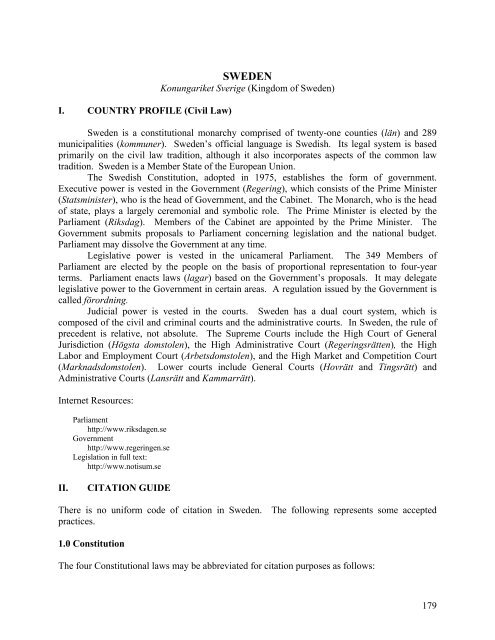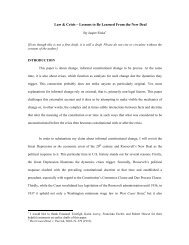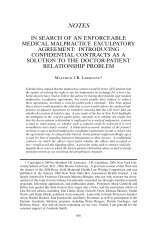- Page 1 and 2:
NEW YORK UNIVERSITY SCHOOL OF LAW J
- Page 3 and 4:
Contents FORWARD AND GENERAL INSTRU
- Page 5 and 6:
6.0 NEWSPAPERS AND WEEKLY JOURNALS
- Page 7 and 8:
JAPAN..............................
- Page 9 and 10:
9.0 CITATION OF ELECTRONIC MATERIAL
- Page 11 and 12:
II. CITATION GUIDE.................
- Page 13 and 14:
2.0 INTERNATIONAL CRIMINAL TRIBUNAL
- Page 15 and 16:
Forward and General Instructions Pu
- Page 17:
Acknowledgements Publication of the
- Page 20 and 21:
2 http://www.jus.gov.ar/ II. CITATI
- Page 22 and 23:
Courts of Ordinary Jurisdiction for
- Page 24 and 25:
III. SELECTED REFERENCES ENRIQUE R.
- Page 26 and 27:
The Federal Court of Australia was
- Page 28 and 29:
Generally, court names are not incl
- Page 30 and 31:
journal title (italicized), article
- Page 32 and 33:
authority to test the constitutiona
- Page 34 and 35:
16 Trial Court for cartels: Kartell
- Page 36 and 37:
There are two guides available for
- Page 38 and 39:
7.0 Official Publications Cite offi
- Page 40 and 41:
Internet Resources: 22 Federal Sena
- Page 42 and 43:
3.0 Jurisprudence Cite cases by typ
- Page 44 and 45:
26 CANADA I. COUNTRY PROFILE (Commo
- Page 46 and 47:
Cite laws by title (italicized), vo
- Page 48 and 49:
7.0 Official Publications Cite offi
- Page 50 and 51:
mainland China in 1997, but which k
- Page 52 and 53:
There is no comprehensive system of
- Page 54 and 55:
III. SELECTED REFERENCES WANG CHENG
- Page 56 and 57:
Administrative Court. Supreme Court
- Page 58 and 59:
Widely used monograph publications
- Page 60 and 61:
the other hand, do not bind Danish
- Page 62 and 63:
Regulations issued under the author
- Page 64 and 65:
46 Poul Nyrup, Europas Fremtid, tal
- Page 66 and 67:
handles cases involving the state.
- Page 68 and 69:
50 The official gazette of Egypt (a
- Page 70 and 71:
Internet Resource: 52 Parliament: h
- Page 72 and 73:
I. COUNTRY PROFILE (Civil Law) 54 F
- Page 74 and 75:
in the Statute Book, decisions of t
- Page 76 and 77:
I. COUNTRY PROFILE (Civil Law) 58 F
- Page 78 and 79:
2.1.1 Official Gazette Laws and dec
- Page 80 and 81:
62 Gazette du Palais (Gaz. Pal. or
- Page 82 and 83:
FRANÇOISE DREYFUS & FRANÇOIS D’
- Page 84 and 85:
of Justice (Bundesgerichtshof). In
- Page 86 and 87:
Many Federal Statutes can be found
- Page 88 and 89:
4.0 Books Cite books by name of the
- Page 90 and 91:
I. COUNTRY PROFILE (Civil Law) 72 G
- Page 92 and 93:
74 Ministerial Decision: Ypourgiki
- Page 94 and 95:
Cite articles in newspapers and wee
- Page 96 and 97:
78 Archive of Consultation (Green)
- Page 98 and 99:
80 Bendtzen, “The Double Marginal
- Page 100 and 101:
India does not have a uniform citat
- Page 102 and 103:
Previous reporters which no longer
- Page 104 and 105:
Cite articles in journals by name o
- Page 106 and 107:
support of the majority of the Hous
- Page 108 and 109:
Major law reporters are entitled an
- Page 110 and 111:
92 ISRAEL Medinat Israel (State of
- Page 112 and 113:
More formal citations, which includ
- Page 114 and 115:
Cite unpublished cases as if citing
- Page 116 and 117:
hears appeals from the Justice of t
- Page 118 and 119:
3.0 Jurisprudence Cite cases by cou
- Page 120 and 121:
I. COUNTRY PROFILE (Civil Law) 102
- Page 122 and 123:
exceptions, the Japanese government
- Page 124 and 125:
6.0 Newspapers and Weekly Journals
- Page 126 and 127:
2.0 Legislation Cite legislation by
- Page 128 and 129:
110 MEXICO Estados Unidos Mexicanos
- Page 130 and 131:
112 phraseology is allowed when the
- Page 132 and 133:
Cite only official reporters, the n
- Page 134 and 135:
JAMES E. HERGER, AN INTRODUCTION TO
- Page 136 and 137:
The Supreme Court is the highest co
- Page 138 and 139:
III. SELECTED REFERENCES DRISS BASR
- Page 140 and 141:
The highest court is the Supreme Co
- Page 142 and 143:
3.1 Courts Ordinary Jurisdiction Co
- Page 144 and 145:
126 NEW ZEALAND I. COUNTRY PROFILE
- Page 146 and 147: Cite bills in the same way as acts
- Page 148 and 149: Cite journal articles only availabl
- Page 150 and 151: 132 NIGERIA Federal Republic of Nig
- Page 152 and 153: 2.4 Edicts 134 Decree No.28 of 1970
- Page 154 and 155: I. COUNTRY PROFILE (Civil Law) 136
- Page 156 and 157: 3.1 Reporters The most common repor
- Page 158 and 159: II. CITATION GUIDE There is no unif
- Page 160 and 161: 4.0 Books 142 Khawaja Textile Mills
- Page 162 and 163: 144 THE PHILIPPINES Republika ng Pi
- Page 164 and 165: 2.3 Codes Cite codes by common titl
- Page 166 and 167: 4.0 Books Cite books by volume (if
- Page 168 and 169: I. COUNTRY PROFILE (Civil Law) 150
- Page 170 and 171: 152 Art. 200 k.k. Alternatively, in
- Page 172 and 173: 1.0 Constitution Cite the Constitut
- Page 174 and 175: 8.0 Unpublished Materials Cite thes
- Page 176 and 177: Rossiiskoi Federatsii). Ten Federal
- Page 178 and 179: There are two main types of preside
- Page 180 and 181: 6.0 Newspapers and Weekly Journals
- Page 182 and 183: II. CITATION GUIDE There is no unif
- Page 184 and 185: 166 SOUTH AFRICA Republic of South
- Page 186 and 187: 3.0 Jurisprudence Cite cases by nam
- Page 188 and 189: 170 SOUTH KOREA Taehan-min'guk (Rep
- Page 190 and 191: 172 Code of Criminal Procedure (Hyo
- Page 192 and 193: III. SELECTED REFERENCES SUPREME CO
- Page 194 and 195: The autonomous communities operate
- Page 198 and 199: 180 Constitution Act: Regeringsform
- Page 200 and 201: 182 SWITZERLAND Confédération Sui
- Page 202 and 203: 2.2 Codes Cite codes by article and
- Page 204 and 205: Tribunaux (JdT), La Semaine Judicia
- Page 206 and 207: I. COUNTRY PROFILE (Civil Law) 188
- Page 208 and 209: II. CITATION GUIDE There is no unif
- Page 210 and 211: calendar, see Section 0.2 above), e
- Page 212 and 213: 194 TANZANIA Jamhuri ya Muungano wa
- Page 214 and 215: 3.2 Unreported Cases Cite unreporte
- Page 216 and 217: 198 Parliament http://www.parliamen
- Page 218 and 219: I. COUNTRY PROFILE (Civil Law) 200
- Page 220 and 221: Other legislative sources of law us
- Page 222 and 223: 204 Lutfi Duran, “Anayasa Mahkeme
- Page 224 and 225: 206 UNITED KINGDOM I. COUNTRY PROFI
- Page 226 and 227: 2.0 Legislation Cite a statute by s
- Page 228 and 229: (BCLC)). In such circumstances, it
- Page 230 and 231: 212 UNITED STATES OF AMERICA I. COU
- Page 232 and 233: 2.1 State and Territory Abbreviatio
- Page 234 and 235: 4.0 Books Cite books by name of the
- Page 236 and 237: 218 UNITED NATIONS & INTERNATIONAL
- Page 238 and 239: They have wide-ranging internationa
- Page 240 and 241: Alternatively, cite U.N. SCOR by vo
- Page 242 and 243: 2.3.1 Parent Organs The major paren
- Page 244 and 245: 2.3.6 Various Examples 226 A/52/4 [
- Page 246 and 247:
3.0 International Court of Justice
- Page 248 and 249:
Maritime Delimitation Between Guine
- Page 250 and 251:
III. SELECTED REFERENCES ROGER A. C
- Page 252 and 253:
European Coal and Steel Community (
- Page 254 and 255:
1.0 Basic Treaties Since most of th
- Page 256 and 257:
Beyond these more formal rules, aut
- Page 258 and 259:
Case 26/76 Metro SB-Grossmärkte Gm
- Page 260 and 261:
Case 168/78 Commission v France (Al
- Page 262 and 263:
Cases 48, 49, 51-57/69 Imperial Che
- Page 264 and 265:
I. ORGANIZATION PROFILE 246 WORLD T
- Page 266 and 267:
Final Act Embodying Uruguay Round:
- Page 268 and 269:
1.2 Subsequent or Informal Citation
- Page 270 and 271:
of GATT/WTO schedules into the Harm
- Page 272 and 273:
254 Treatment by Germany of Imports
- Page 274 and 275:
III. SELECTED REFERENCES JEANNE REH
- Page 276 and 277:
4.2 General Comments Cite general c
- Page 278 and 279:
260 III. HYBRID COURTS (Internation
- Page 280 and 281:
2.1.1 Unreported Decisions before N
- Page 282 and 283:
1.3 Separate Opinions Cite separate
- Page 284 and 285:
266 Significant Multilateral Treati
- Page 286 and 287:
3.0 Human Rights Convention on the
- Page 288 and 289:
11.2 Road Traffic Convention on Roa
- Page 290 and 291:
23.0 Antarctica Antarctic Treaty (W
- Page 292 and 293:
4.0 Relationship of International a
- Page 294 and 295:
12.0 State Responsibility Salem Cas
- Page 296:
21.0 International Trade Law [See t
















